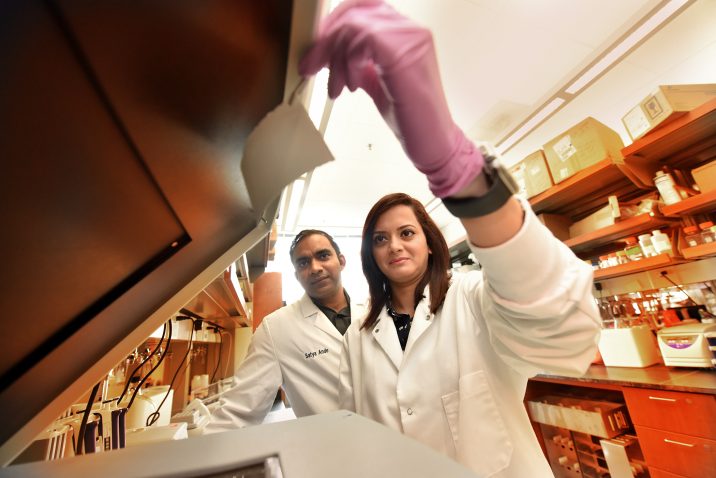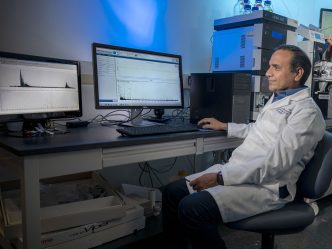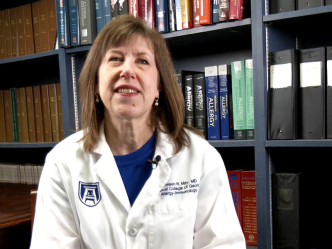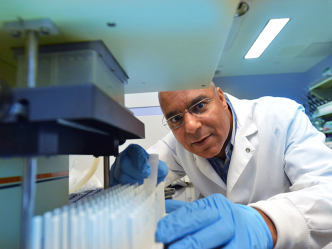An enzyme induced by stress to help reduce production of damaging free radicals is also used by liver cancer to regulate two major cell proliferation pathways that enable the cancer to thrive, scientists report.
They’ve also found that when they block the enzyme Nqo1, it dramatically reduces the proliferation of liver cancer cells, a hallmark of cancer’s ability to survive and thrive, they report in the journal HEPATOLOGY.
Nqo1 is highly expressed in both their mouse model of liver cancer and in human liver cancer, where scientists at the Georgia Cancer Center and Medical College of Georgia at Augusta University have found it acts upstream to activate the PI3K/Akt and MAPK/ERK pathways.
Both pathways are key to enabling the metabolic reprogramming that enables cancer cells’ super-efficient use of glucose as fuel and ultimately their rapid replication.
Knocking out Nqo1 blocks the metabolic adaptation needed to enable liver cancer cell proliferation, says Dr. Satya Ande, molecular biologist in the MCG Department of Biochemistry and Molecular Biology and Georgia Cancer Center. “The proliferation of liver cancer cells is dramatically suppressed,” he says.
Proliferation and cell survival are likely the most important functions of these key pathways, which normally function at a low, basal level, says MCG postdoctoral fellow Dr. Manali Dimri.
“Somehow these pathways are also interacting with each other via different target genes,” Dimri says. “And, eventually, they are working together for cell proliferation, migration and metabolism.”
Natural tumor suppressors are regularly inactivated in cancer, and Ande and Dimri also found that in liver cancer, the tumor suppressor PTEN is another primary target of Nqo1, but in this case, it’s turning PTEN down. One way PTEN works is directly opposed to the work of Nqo1 in liver cancer because PTEN works against the PI3K/Akt and MAPK/ERK pathways. PTEN elevation can directly combat the so-called Warburg effect, which is cancer cells’ heightened use of glucose for fuel.
The fact that Nqo1 targets two — rather than a single— important downstream pathways, increases its value as a likely treatment target, Dimri says. The reality that Nqo1 is highly expressed in other cancers as well like breast, pancreas, ovarian and thyroid cancers, suggests it has a role in and may be a good therapeutic target for those as well, Ande says.
They started their work to find a better way to kill liver cancer by comparing normal mouse livers to cancerous ones to identify the likely long list of genes upregulated in liver cancer compared with a healthy liver. That’s when they found Nqo1 was highly upregulated; and a logical next question was what the Nqo1 is doing in liver cancer, Dimri says. High expression of Nqo1 has generally been correlated with increased tumor size, a more advanced stage of cancer and ultimately decreased patient survival. But how it aids cancer cell proliferation has mostly remained a mystery.
The scientists found Nqo1 was necessary to simultaneously activate the PI3K/Akt and MAPK/ERK pathways in liver cancer, pathways already known to be hyperactive in liver cancer and known to have a lot of crosstalk.
Their findings provide more evidence of Nqo1’s function as an oncogene, defined as a mutated form of a gene involved in normal cell growth that is now supporting cancer cell growth, according to the National Cancer Institute. Oncogenes can be inherited or result from environmental exposures.
Next steps include a large screening of existing drugs to see if any are adept at suppressing Nqo1. They’ve already tried some drugs known to suppress it and found they were good at suppressing just its enzymatic activity, its free radical scavenging, but not at impacting liver cancer’s ability to replicate.
Under more normal conditions, Nqo1 works to help eliminate free radicals, unstable atoms which are generated, for example, by our use of oxygen, but which at high levels contribute to sickness and aging. Free radicals can aid cancer development, but rapidly replicating cancer cells produce a lot of free radicals, which can ultimately also damage them. Because Nqo1 has been found at high levels in so many cancers, it has been thought that it helped cancer cells survive, rather than commit suicide, by scavenging free radicals. Their evidence suggests Nqo1 has no role in scavenging free radicals in liver cancer, Ande says.
Now they also want to look at Nqo1’s activity in other liver cancer models. For these studies they used the standard model, which uses a chemical to produce liver cancer and closely mimics many liver cancers in humans, but now they also want to look at other models of this condition that has diverse causes.
Risk factors for liver cancer include chronic hepatitis A or B infection that can result in a scarring of the liver called cirrhosis, which increases liver cancer risk, as well as alcohol abuse, smoking and, increasingly in this country, non-alcoholic fatty liver disease resulting from obesity, according to the American Cancer Society.
The incidence of liver cancer has tripled in the United States since 1980, according to the American Cancer Society, and the condition is three times more common in males. Liver cancer death rates have also increased, just over 2 percent per year since 2007, and it’s a leading cause of death worldwide.
The research was supported by the National Institutes of Health.
View the published study.
 Augusta University
Augusta University





